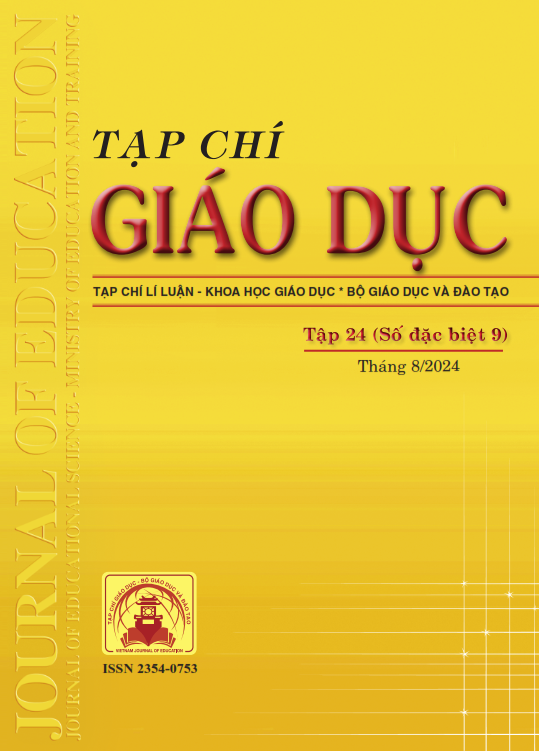Nghiên cứu mối liên hệ giữa trí tuệ cảm xúc và sự tự tin đưa ra quyết định nghề nghiệp của sinh viên Trường Đại học Nguyễn Tất Thành
Tóm tắt
In today’s dynamic and competitive job market, the ability to make informed career decisions is paramount for university students as they are prepared to transition into the professional world. Emotional intelligence and career decision-making self-efficacy appear to play a crucial role in shaping career path and achieving career-related goals. This study uses a quantitative method, with 2 objectives: (1) Assessing the level of emotional intelligence, through 4 aspects: self-awareness, emotional self-regulation, empathy, relationship management; (2) Assessing the level of confidence in making career decisions, expressed through 5 criteria: Choosing career goals; Understanding careers; Career planning, Solving related problems, Self-assessment of personal strengths. The results from 275 survey samples showed an average - good level in both emotional intelligence and confidence, with no significant differences in age and gender. The results also showed a positive relationship between these two factors. The study hopes to provide recommendations to enhance emotional intelligence and confidence in learners when making career decisions.
Tài liệu tham khảo
Bandura, A., & Wessels, S. (1997). Self-efficacy (pp. 4-6). Cambridge: Cambridge University Press.
Bar-On, R. (1997). Emotional intelligence. International Journal of Sociology and Social Policy, 29, 164-175.
Belfield, C., Bowden, A. B., Klapp, A., Levin, H., Shand, R., & Zander, S. (2015). The economic value of social and emotional learning. Journal of Benefit-Cost Analysis, 6(3), 508-544. https://doi.org/10.1017/bca.2015.55
Boyatzis, R. E. (2009). Competencies as a behavioral approach to emotional intelligence. Journal of Management Development, 28(9), 749-770. https://doi.org/10.1108/02621710910987647
Brackett, M. A., Rivers, S. E., & Salovey, P. (2011). Emotional intelligence: Implications for personal, social, academic, and workplace success. Social and Personality Psychology Compass, 5(1), 88-103.
Brown, C., George-Curran, R., & Smith, M. L. (2003). The role of emotional intelligence in the career commitment and decision-making process. Journal of Career Assessment, 11(4), 379-392. https://doi.org/10.1177/ 1069072703255834
Caruso, D. R., & Wolfe, C. J. (2004). Emotional intelligence and leadership development. In Leader development for transforming organizations (pp. 237-263). Psychology Press.
Cohen, J. (1977). Statistical power analysis for the behavioral sciences. New York: Academic Press.
Elias, M. J., Kress, J. S., & Hunter, L. (2013). Emotional intelligence and the crisis in schools. In Emotional intelligence in everyday life (pp. 166-186). Psychology Press.
Goleman, D. (1995). Emotional intelligence. New York: Bantam Books.
Goleman, D. (1998). Working with emotional intelligence. New York: Bantam Books.
Grotevant, H. D., Cooper, C. R., & Kramer, K. (1986). Exploration as a predictor of congruence in adolescents’ career choices. Journal of Vocational Behavior, 29(2), 201-215. https://doi.org/10.1016/0001-8791(86)90004-7
Jacobs, R. L. (2001). Using human resource functions to enhance emotional intelligence. In The emotionally intelligent workplace: How to select for measure, and improve emotional intelligence in individuals, groups and organizations, 159-181.
Mayer, J. D., & Salovey, P. (2007). Mayer-Salovery-Caruso emotional intelligence test. Toronto: Multi-Health Systems Incorporated.
Mayer, J. D., Caruso, D. R., & Salovey, P. (1997). Emotional Intelligence Meets. Intelligenece, 27(4), 267-298.
Natia, B., & Nino, S. (2020). Career Decision Making Difficulties, Career Decision Making Self-Efficacy, and Autonomous Functioning Among First Year Students. Psychology and Education, 57(2), 91-94.
Petrides, K. V., & Furnham, A. (2001). Trait emotional intelligence: Psychometric investigation with reference to established trait taxonomies. European Journal of Personality, 15(6), 425-448.
Ran, Z. O. U., Zeb, S., Nisar, F., Yasmin, F., Poulova, P., & Haider, S. A. (2022). The impact of emotional intelligence on career decision-making difficulties and generalized self-efficacy among university students in China. Psychology Research and Behavior Management, 15, 865-874.
Salovey, P., & Mayer, J. D. (1990). Emotional intelligence. Imagination, Cognition, and Personality, 9, 185-211.
Stough, C., Saklofske, D. H., & Parker, J. D. (2009). A brief analysis of 20 years of emotional intelligence: An introduction to assessing emotional intelligence: Theory, research, and applications. Assessing emotional intelligence: Theory, research, and applications. In The Springer Series on Human Exceptionality, 3-8.
Sun, G., & Lyu, B. (2022). Relationship between emotional intelligence and self-efficacy among college students: the mediating role of coping styles. Discover Psychology, 2(42). https://doi.org/10.1007/s44202-022-00055-1
Taylor, K. M., & Betz, N. E. (1983). Applications of self-efficacy theory to the understanding and treatment of career indecision. Journal of Vocational Behavior, 22(1), 63-81. https://doi.org/10.1016/0001-8791(83)90006-4
Tải xuống
Đã Xuất bản
Cách trích dẫn
Số
Chuyên mục
Giấy phép

Tác phẩm này được cấp phép theo Ghi nhận tác giả của Creative Commons Giấy phép quốc tế 4.0 .












